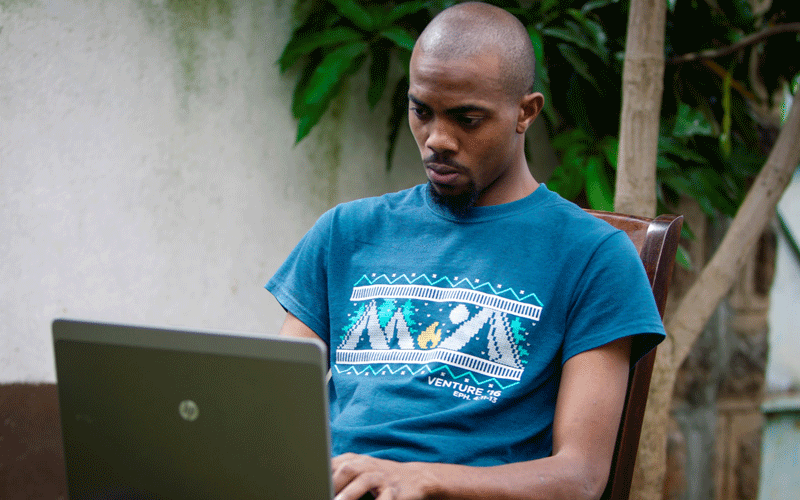New app takes the stress out of job-seeking

Several months ago, a training session on digital empowerment to help people get jobs online and a difficult encounter of finding one gave birth to KaziWazi.
Started by Ian Mwangi, KaziWazi, coined from Swahili word meaning open jobs, is a responsive web application that connects job seekers and opportunities in different sectors.
“With this app, you don’t have to pay to register on the platform. You only need to be aware of it and be able to have internet connectivity to enjoy,” says Mwangi during the interview in Kibera, Nairobi.
“I want to help create employment opportunities among graduates and professionals and leave a mark and be part of the gig economy.
The app serves as a solution for people with jobs looking for people to do them and a solution for people looking for jobs to do,” he adds.
The 27-year-old IT graduate and HTML and Visual Studio 2019 certified guru quit his job with an international pharmaceutical giant to fully concentrate on the start-up.
The soft-spoken entrepreneur, together with other co-directors of the start-up met early in the year during Empact initiative, a World Food Programme project aimed at helping the youth get online jobs.
They saw a business opportunity in a segment that is always operated on a referral basis.
With the app, they target people both in the formal and informal sector who have skills on construction, technology, transportation, media, and training.
It is an attempt of the young entreprenuers to address youth unemployment, which is currently high at 11.4 per cent, according to 2015/16 Labour Force basic report released in March 2018.
Mwangi says many young people well trained in different areas are unable to get meaningful employment, a gap that his outfit wants to fill.
With freelance work gaining ground during this Covid-19 period, getting a logo designer, an architecture, electrician or a writer-especially in the urban areas will be a click away.
How it works
“Some of our customers are institutions who need a business plan written, for instance, or want a website for their gated community developed among others.
We have been able to link a client who needed their residential field designed and modelled into a proper recreational space and we got it fixed to the standards,” explains Mwangi.
Mwangi adds, “Users post jobs or services on the KaziWazi website and fills the form on the categories.
The employer is required to give details and specifications of the services to be rendered and the charges.”
After two working days the job is verified and posted on the website.
“To find a job, one only needs to apply and the team from KaziWazi will vet the every application.
If the applicant matches what the job owner wants, we award the job to them and take it off the site,” says Mwangi.
With only few staff at the moment, the one and half month’s old start-up has linked two lucrative jobs with the required skills.
Mwangi says surging demand for professional and quality services keeps him awake as he tries to tie the nuts and bolts of the app.
He has resorted to online tutorials to cut his teeth in the murky tech world. “Online learning has basically become my university,” says the self-taught software enthusiast.
And where did his love for tech sprout from? As early as 2000, Mwangi had started interacting with computers at St Paul Thomas Academy, Maragua with keen interest in software.
Timeless passion
His love for tech would explode in Njiiri Boys High School, representing the institution in several science congress competitions.
While in form three and together with two friends, Mwangi redesigned the movement of cars in the popular game called Rock Star. They would later develop a calculator.
“We used to change coding games. And for every science congress we went, we always excelled,” explains Mwangi.
He remembers his first app, an encyclopedia they had entered in a science congress whose theme was environmental conservation.
It was software aimed at educating users on how to conserve the environment and the effects of pollution. It played videos and showed articles on environment conservation.
He later joined Kenya Methodist University to pursue Computer Informatics in 2011 and before he started classes, he joined Snider Electrics as a trainee programmer and would be hired after three months.
While there, he developed a software that was able to calculate the whole price for generators with different kilowatts.
Doorstep solutions
After two years, he quit and formed an IT company with his two friends from high school.
However, with little entrepreneurial skills, the trio did not make much out of their sweat. “I don’t think we actually got value on some of the jobs we did,” he recalls.
At the start of 2019, after a bit of soul-searching, he joined Vision Institute for a diploma in IT course to sharpen his skills.
But it was the unit on entrepreneurship that propelled his mindset change.
“Everybody has a good idea but I came to realise it is nothing if it doesn’t meet the business plan. I was able to learn how tech survive in the real world,” notes Mwangi.
Mwangi compares KaziWazi services to that of US gig platform Fiverr-which provides online marketplace for freelance services.
“We offer a convenient solution and remove the worries of having to bargain every time a professional comes to you.
We want to bring solutions right at your doorstep.Kaziwazi is Kenya’s equivalent of Fiverr, and we hope to move it even to greater heights” he says.












